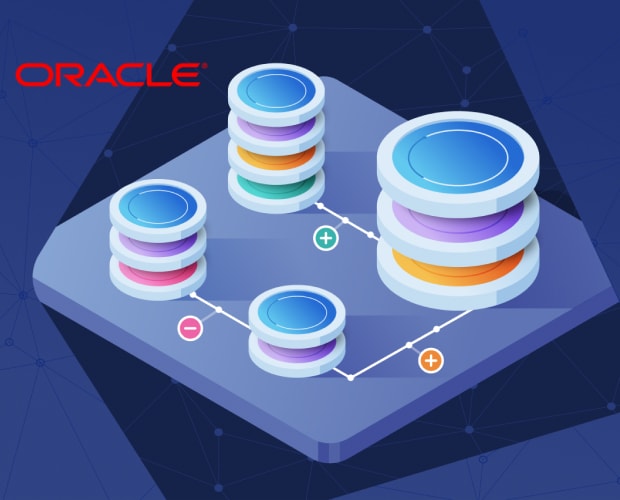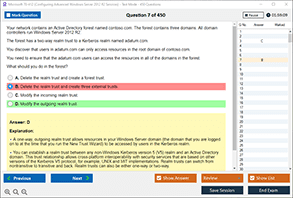
1z0-149: Oracle Database Program with PL/SQL
Best Seller
110 Lectures
22h 56m
Prepare for your Oracle examination with our training course. The 1z0-149 course contains a complete batch of videos that will provide you with profound and thorough knowledge related to Oracle certification exam. Pass the Oracle 1z0-149 test with flying colors.
$13.99$24.99
Curriculum For This Course
- 1. What is PL/SQL and Why to Use? 6m
- 2. PL/SQL Architecture 10m
- 1. Which Option to Choose to Have a Database? 9m
- 2. Option 1: Having the Database with the Oracle Virtual Box 16m
- 3. What is Pluggable Database? 3m
- 4. Option 2: Downloading and Installing the Oracle Database 18m
- 5. Option 2: Unlocking the HR Schema 8m
- 6. Option 2: Configuring and Using the SQL Developer 22m
- 7. Option 3: Using Oracle Live SQL 8m
- 1. Anonymous Blocks 14m
- 2. PL/SQL Outputs 8m
- 1. What are Variables and Why to Use Them? 9m
- 2. Naming Rules & Naming Conventions 4m
- 3. Declaring & Initializing & Using Variables - Part 1 11m
- 4. Declaring & Initializing & Using Variables - Part 2 10m
- 5. Using %TYPE Attribute 7m
- 6. PL/SQL Delimiters and Commenting Your Code 6m
- 7. PL SQL Variable Scope 11m
- 8. Using Bind Variables 11m
- 1. What are Control Structures & IF Statements 14m
- 2. Case Expressions 15m
- 3. What are Loops - Basic Loops 10m
- 4. While Loops 6m
- 5. For Loops 10m
- 6. Nested Loops & Loop Labeling 16m
- 7. Continue Statement 10m
- 8. GOTO Statement 14m
- 1. Operating with Selected Database Data.. 18m
- 2. DML Operations in PL/SQL 13m
- 3. Using Sequences in PL/SQL 13m
- 4. Bonus - Enabling Server Outputs by Default. 5m
- 1. Simple Data Types vs Composite Data Types 8m
- 2. PL/SQL Records - Part 1 17m
- 3. PL/SQL Records - Part 2 17m
- 4. Easy DML With Records 8m
- 5. What Are Collections? 6m
- 6. Varrays & Collection Methods 23m
- 7. Nested Tables 11m
- 8. PL&SQL Associative Arrays (Part 1) 19m
- 9. PL&SQL Associative Arrays (Part 2) 15m
- 10. Storing Collections in Tables - (Part 1) 14m
- 11. Storing Collections in Tables - (Part 2) 11m
- 1. What are Cursors and Cursor Types in PL SQL? 8m
- 2. Using Explicit Cursors 11m
- 3. Using Cursors with Records 6m
- 4. Looping with Cursors 12m
- 5. PL SQL Cursors with Parameters 14m
- 6. PL SQL Cursor Attributes 8m
- 7. For Update Clause 21m
- 8. Where Current Of Clause 10m
- 9. Reference Cursors 24m
- 1. What are the Exceptions? 9m
- 2. Handling the Exceptions! 18m
- 3. Handling the Nonpredefined Exceptions 6m
- 4. Handling & Raising User-Defined Exceptions 8m
- 5. Using RAISE_APPLICATION_ERROR() Procedure 8m
- 1. What are Functions & Procedures and Why We Use? 9m
- 2. Creating and Using Stored Procedures 17m
- 3. Using IN & OUT Parameters 15m
- 4. Named & Mixed Notations and Default Option 16m
- 5. Creating and Using Functions (Part 1) 17m
- 6. Creating and Using Functions (Part 2) 7m
- 7. Local Subprograms 15m
- 8. Overloading the Subprograms 13m
- 9. Handling the Exceptions in Subprograms 20m
- 10. Finding & Removing the Subprograms 11m
- 11. Regular & Pipelined Table Functions 20m
- 1. What Are Packages? 10m
- 2. Creating & Using & Modifying & Removing the Packages 27m
- 3. Visibility of Package Objects 11m
- 4. Illegal Object Reference & Forward Declaration 7m
- 5. Package Initialization 9m
- 6. Persistent State of Packages - Part 1 19m
- 7. Persistent State of Packages - Part 2 14m
- 8. Using Collections in Packages - Part 1 26m
- 9. How Can I Find the Packages? 7m
- 1. What are Triggers & Trigger Types 10m
- 2. Understanding DML Triggers 11m
- 3. Specifying the Timing of Triggers 19m
- 4. Statement & Row Level Triggers 13m
- 5. Using New & Old Qualifiers in Triggers 19m
- 6. Using Conditional Predicates 10m
- 7. Using RAISE_APPLICATION_ERROR Procedure in Triggers 6m
- 8. Using Update Of Event in Triggers 6m
- 9. Using WHEN Clause in Triggers 7m
- 10. INSTEAD OF Triggers 20m
- 11. Exploring & Managing the Triggers 8m
- 12. Creating Disabled Triggers 5m
- 13. Additional Real-World Examples for DML Triggers 21m
- 14. Compound Triggers 28m
- 15. Handling Mutating Table Errors 20m
- 1. PL/SQL Debugging: Debugging Your Subprograms - (Part 1) 11m
- 2. PL/SQL Debugging: Debugging Your Subprograms - (Part 2) 11m
- 3. PL/SQL Debugging: Debugging Your Subprograms - (Part 3) 9m
- 4. PL/SQL Debugging: Debugging the Anonymous Blocks 6m
- 1. Introduction to Dynamic SQL and Dynamic PL/SQL 13m
- 2. Native Dynamic SQL, PL/SQL 11m
- 3. EXECUTE IMMEDIATE Statement 11m
- 4. EXECUTE IMMEDIATE STATEMENT with the USING Clause 15m
- 5. EXECUTE IMMEDIATE STATEMENT with the USING and INTO Clauses 13m
- 6. EXECUTE IMMMEDIATE with BULK COLLECT INTO Clause 6m
- 7. Dynamic PL/SQL Blocks 12m
- 8. OPEN - FOR, FETCH Statements 7m
- 9. Using the DMBS_SQL Package (The Method 4) 24m
- 1. Using the DBMS_OUTPUT Package 14m
- 2. Using the UTL_FILE Package (Part 1) 16m
- 3. Using the UTL_FILE Package (Part 2) 18m
- 4. Using the UTL_FILE Package (Part 3) 12m
- 5. Using the UTL_MAIL Package (Part 1) 13m
- 6. Using the UTL_MAIL Package (Part 2) 14m
Hot Exams
Isaca CRISC Exam Dumps
Microsoft AZ-140 Exam Dumps
Cisco 200-301 Exam Dumps
Microsoft AZ-900 Exam Dumps
Isaca CISA Exam Dumps
Amazon AWS SAA-C03 Exam Dumps
Microsoft AZ-700 Exam Dumps
F5 101 Exam Dumps
BICSI INSTC_V7 Exam Dumps
NCLEX NCLEX-RN Exam Dumps
Palo Alto Networks PCNSE Exam Dumps
ISC2 SSCP Exam Dumps
Huawei H35-210_V2.5 Exam Dumps
Okta Okta-Certified-Administrator Exam Dumps
Amazon AWS SOA-C02 Exam Dumps
Citrix 1Y0-241 Exam Dumps
Test Prep LSAT-Test Exam Dumps
Acquia Acquia-Certified-Site-Builder-D8 Exam Dumps
Cisco 350-801 Exam Dumps
Cisco 350-401 Exam Dumps
Microsoft AZ-900 Exam Dumps
Amazon AWS SAA-C03 Exam Dumps
Cisco 200-301 Exam Dumps
Isaca CRISC Exam Dumps
Microsoft AZ-500 Exam Dumps
Palo Alto Networks PCNSE Exam Dumps
Acquia Acquia-Certified-Site-Builder-D8 Exam Dumps
Microsoft AZ-700 Exam Dumps
Microsoft AZ-305 Exam Dumps
CompTIA SY0-701 Exam Dumps
Isaca CISM Exam Dumps
Isaca CISA Exam Dumps
ISC2 SSCP Exam Dumps
Microsoft MB-310 Exam Dumps
Cisco 350-401 Exam Dumps
Cisco 350-801 Exam Dumps
Microsoft AZ-104 Exam Dumps
Microsoft DP-300 Exam Dumps
Microsoft AI-900 Exam Dumps
Test Prep MCAT-Test Exam Dumps
How to Open Test Engine .dumpsarena Files
Use FREE DumpsArena Test Engine player to open .dumpsarena files

Refund Policy

DumpsArena.com has a remarkable success record. We're confident of our products and provide a no hassle refund policy.

Your purchase with DumpsArena.com is safe and fast.
The DumpsArena.com website is protected by 256-bit SSL from Cloudflare, the leader in online security.
